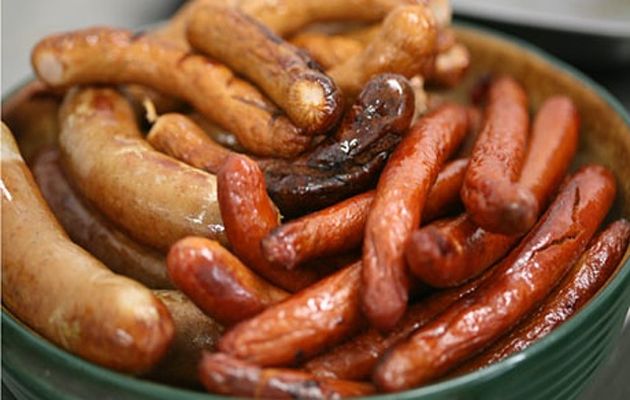Hot dogs, bacon, and other processed meats raise the risk of cancer, and red meat probably contributes to the disease, too, according to the World Health Organization.

Processed meats have the potential to cause cancer in humans, according to a report by a World Health Organization (WHO) agency that is drawing ire from meat industry groups that argue the science is inadequate.
The determination, published by a panel of researchers for the International Agency for Research on Cancer (IARC) in a medical journal, classifies processed meat products like salami, sausages and bacon carcinogenic to humans, the strongest level of risk for cancer, and a category shared with tobacco smoke and diesel engine exhaust.
The report says 50g of processed meat a day - less than two slices of bacon - increased the chance of developing colorectal cancer by 18%.
Meanwhile, it also argues red meats are "probably carcinogenic" but there was limited evidence. The WHO did stress that meat also had health benefits.
The IARC, considered an authority in evaluating evidence on cancer causation cited studies that conclude there is strong evidence to support a link between eating too much meat and the onset of colorectal cancer, the third-most common type world-wide.
“On the basis of the large amount of data and the consistent associations of colorectal cancer with consumption of processed meat across studies in different populations, which make chance, bias, and confounding unlikely as explanations, a majority of the Working Group concluded that there is sufficient evidence in human beings for the carcinogenicity of the consumption of processed meat”, the report, which appears in the Lancet Oncology, states.
Cancer Research UK said this was a reason to cut down rather than give up red and processed meats. And added that an occasional bacon sandwich would do little harm.
BACON, SAUSAGES, SALAMI AND MORE
Processed meat has been modified to either extend its shelf life or change the taste and the main methods are smoking, curing, or adding salt or preservatives. It includes bacon, sausages, hot dogs, salami, corned beef, beef jerky and ham as well as canned meat and meat-based sauces.
It is the chemicals involved in the processing which could be increasing the risk of cancer. High temperature cooking, such as on a barbecue, can also create carcinogenic chemicals.
 What is proccesed meat? / BBC
What is proccesed meat? / BBCIt has now placed processed meat in the same category as plutonium, but also alcohol as they definitely do cause cancer. However, this does not mean they are equally dangerous. A bacon sandwich is not as bad as smoking.
"For an individual, the risk of developing colorectal (bowel) cancer because of their consumption of processed meat remains small, but this risk increases with the amount of meat consumed", Dr Kurt Straif from the WHO said. That is in contrast to one million deaths from cancer caused by smoking and 600,000 attributed to alcohol each year.
Red meat does have nutritional value too and is a major source of iron, zinc and vitamin B12. Nevertheless, the WHO said there was limited evidence that 100g of red meat a day increased the risk of cancer by 17%.
Prof Tim Key, from the Cancer Research UK and the University of Oxford, said: "This decision doesn't mean you need to stop eating any red and processed meat, but if you eat lots of it you may want to think about cutting down.
"People should limit consumption of red meat and avoid consuming processed meat, but they should also have a diet rich in fibre, from fruit and vegetables and maintain an adequate body weight throughout life and limit the consumption of alcohol and be physically active", Dr Teresa Norat, an advisor to the WHO report from Imperial College London, told BBC.
FOOD INDUSTRY DISAGREES
The results by the 22-person panel, which consisted of scientists from 10 nations, already have drawn criticism from meat and food industry groups that have braced for such decisions for years, in part by funding research on the benefits of eating meat.
The conclusions by the agency “defy both common sense and dozens of studies showing no correlation between meat and cancer and other studies showing the many health benefits of balanced diets that include meat,” says the North American Meat Institute.
The Meat Advisory Panel in UK, affirms that "avoiding red meat in the diet is not a protective strategy against cancer" and said the focus should be alcohol, smoking and body weight.

Las opiniones vertidas por nuestros colaboradores se realizan a nivel personal, pudiendo coincidir o no con la postura de la dirección de Protestante Digital.
Si quieres comentar o